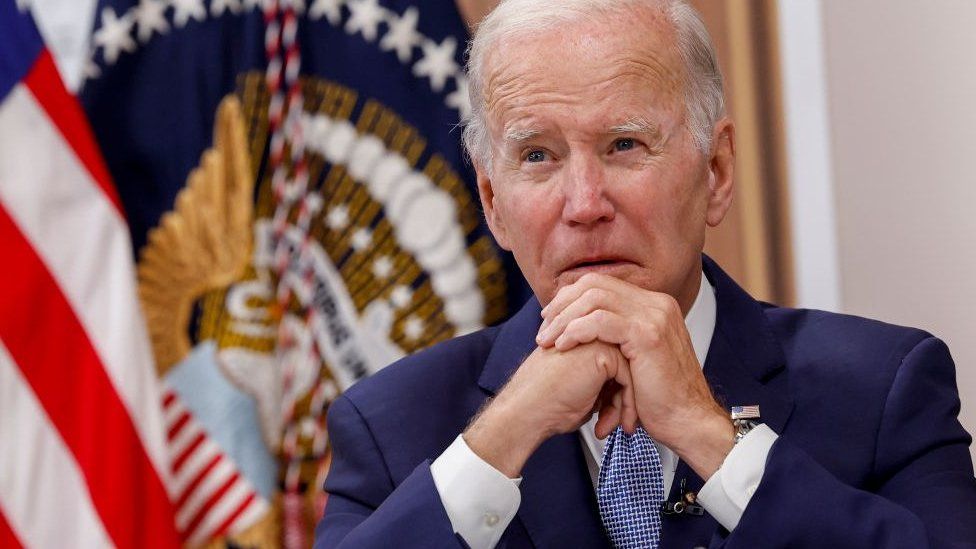US presidential election 2024: Joe Biden's Democratic challengers
- Published

US President Joe Biden is running for re-election next year, but national opinion polls and weak job approval ratings suggest voters may not be keen to re-nominate him.
Mr Biden, 80, formally announced his 2024 re-election bid in April, telling voters the country is in a pivotal moment and he needs more time to "finish this job".
The Democratic Party faithful, including elected leaders and top donors, are backing him up - but many voters still need convincing he is the best candidate the party has.
Significant numbers of Democrats have called for other options, expressing concern over Mr Biden's age, mental acuity and a series of challenges ahead, both domestic and global.
The president's approval ratings have also declined to the lowest of his tenure, in overall terms and among Democrats.
But with the party unlikely to schedule any debates ahead of the primary election, he is not expected to face a serious contest.
So who is challenging Mr Biden?
Dean Phillips
Minnesota Congressman Dean Phillips filed a long-shot bid for the nomination in late October, after calling on Mr Biden to step aside for months.
Mr Phillips, 54, has served in the US House of Representatives since 2019 and represents a mostly suburban district that includes parts of Minneapolis' outskirts.
The former businessman is a moderate Democrat and, prior to his bid, stepped down from his position as an elected leader in the House Democratic minority.
He claims the man he is challenging has done "a spectacular job" as president but that "it is time for the torch to be passed to a new generation of American leaders".
The Democrat has hired Jeff Weaver, a top adviser to Bernie Sanders in his 2016 and 2020 presidential bids, and Zach Graumann, campaign manager to Andrew Yang's 2020 bid, as senior strategists.
Another hire, Steve Schmidt, who was a top adviser to Republican John McCain's 2008 campaign, helped with Mr Phillips' launch and is now leading outside fundraising efforts.
Mr Phillips' policy offering does not substantially differ from that of Mr Biden, but his challenge represents an undercurrent of Democratic discontent.
Early polling and campaign events, however, suggest the little-known lawmaker's entry has done little to shake up the race.
Marianne Williamson
Self-help guru Marianne Williamson was the first Democrat to jump into the 2024 race, with a formal campaign launch in March.
Ms Williamson, 70, is a long-time social justice activist, best-selling author and former "spiritual advisor" to Oprah Winfrey who made her first foray into politics in 2020.
She transfixed audiences with a frenetic performance at two Democratic primary debates, in which she declared that the only way to defeat Donald Trump was to "harness love for political purposes".
The fringe candidate ended that campaign before voting began but she has remained an outspoken voice for the progressive left.
Her 2024 policy platform backs universal government-run healthcare, free childcare, at least $1tn (£800bn) in slavery reparations to black Americans and a federal agency called the Department of Peace.
Ms Williamson has sought to engage young voters through TikTok, but her campaign has gained little to no traction, barely registering in most polls.
Cenk Uygur
Progressive political commentator Cenk Uygur announced he was running for the Democratic nomination on his Young Turks talk show in October.
Mr Uygur, 53, founded and has hosted the programme since 2002, during which time he has built an outspoken, populist persona and often courted controversy with his views.
But his quixotic bid for the White House faces one major obstacle: he was born in Turkey, which makes him ineligible under the Constitution to run for the office.
Mr Uygur plans legal action to challenge wording that he says renders naturalised US citizens like him "second-class citizens".
Already though, election officials in two early voting states - New Hampshire and Nevada - have said he will not appear on primary ballots.
Related Topics
- Published2 November 2023
- Published21 January
- Published9 October 2023